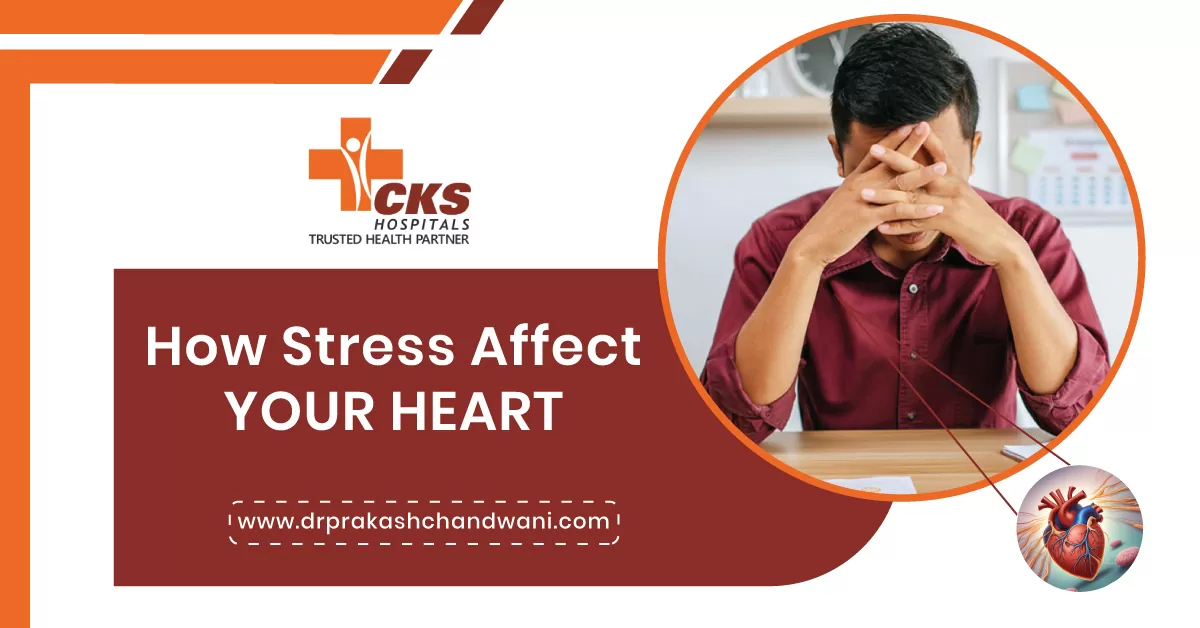

How Stress Affect YOUR HEART?
How Stress Affect Your Heart: Understanding the profound impact of stress on heart health is crucial in today’s fast-paced lifestyle. Stress doesn’t just affect our mental state; it can also exert significant physiological effects on the heart. Research shows that chronic stress can lead to elevated blood pressure, increased heart rate, and inflammation, all of which contribute to a higher risk of cardiovascular diseases like heart attacks and strokes. By exploring how stress influences the cardiovascular system, we can better appreciate the importance of stress management techniques in maintaining a healthy heart. This will also help you to know that if you are dealing with any cardiac problem, you must reach out to Cardiologist in Jaipur and get the treatment!
Know About How Stress Affect Your Heart?
1. Increased Blood Pressure
Stress can significantly impact cardiovascular health by elevating blood pressure. When stressed, the body releases hormones like adrenaline and cortisol, which temporarily increase heart rate and constrict blood vessels. Over time, chronic stress can lead to sustained high blood pressure (hypertension), putting strain on the heart and increasing the risk of heart disease, stroke, and other complications.
2. Altered Heart Rhythm
Stress can disrupt the normal rhythm of the heart, leading to palpitations or arrhythmias. This occurs due to the activation of the sympathetic nervous system during stress, which can cause irregular heartbeats. Persistent stress can contribute to chronic arrhythmias, potentially increasing the risk of more serious cardiovascular events if left untreated.
3. Increased Risk of Heart Disease
Chronic stress is linked to an increased risk of developing heart disease. Stress contributes to unhealthy behaviors such as overeating, smoking, or lack of exercise, all of which are risk factors for cardiovascular conditions like coronary artery disease. Additionally, prolonged stress promotes inflammation and oxidative stress in the body, which can damage blood vessels and contribute to the buildup of plaque (atherosclerosis), narrowing arteries and restricting blood flow to the heart.
4. Weakened Immune System
Stress weakens the immune system’s ability to defend against infections and inflammation. This can indirectly affect heart health as chronic infections and inflammation contribute to cardiovascular disease risk. Stress hormones like cortisol suppress immune function, making individuals more vulnerable to illnesses that can impact heart health over time.
5. Increased Clotting Risk
Stress activates the body’s clotting mechanism, preparing it for potential injury. However, chronic stress can lead to excessive clotting, increasing the risk of heart attack or stroke. Stress-induced changes in blood clotting factors and platelet activation can promote the formation of blood clots in arteries, potentially leading to blockages that restrict blood flow to vital organs, including the heart.
6. Worsened Lifestyle Habits
Stress often leads to unhealthy coping mechanisms such as poor diet choices, excessive alcohol consumption, lack of physical activity, and inadequate sleep—all of which can negatively impact heart health. These behaviors contribute to obesity, high cholesterol, and other cardiovascular risk factors, exacerbating the effects of stress on the heart.
Reach Dr. Prakash Chandwani Cardiologist in Jaipur for heart disease treatment!
For comprehensive heart disease treatment in Jaipur, Dr. Prakash Chandwani stands as a popular Cardiologist in Jaipur. With a commitment to patient-centered healthcare, he brings years of experience in diagnosing and managing various cardiac conditions, ranging from coronary artery disease to arrhythmias and heart failure. His practice is equipped with advanced diagnostic tools and treatment options, ensuring patients receive precise and effective care tailored to their individual needs.
Whether you seek preventive care, treatment for an existing heart condition, or guidance on lifestyle changes for heart health, Dr. Prakash Chandwani offers expert guidance and support. Choosing Dr. Chandwani means choosing excellence in cardiovascular care, with a focus on improving heart function and enhancing the overall quality of life for his patients in Jaipur and beyond.
FAQ: How Does Stress Affect Your Heart?
1. How does stress affect heart health?
Stress can elevate blood pressure and heart rate, increasing the risk of cardiovascular problems like heart disease and stroke. Managing stress is crucial for maintaining heart health.
2. What are effective stress management techniques?
Techniques such as deep breathing exercises, meditation, yoga, and regular physical activity help reduce stress levels. Finding hobbies and activities that bring joy also promotes relaxation.
3. How does diet impact heart health during stressful times?
Eating a balanced diet rich in fruits, vegetables, lean proteins, and whole grains supports heart health. Limiting caffeine, alcohol, and processed foods can also help manage stress and maintain a healthy heart.
4. Is adequate sleep important for heart health?
Yes, getting enough sleep (7-9 hours per night for most adults) is essential for heart health and stress management. Quality sleep enhances overall well-being and helps regulate stress hormones.
5. How does social support contribute to heart health?
Maintaining strong social connections and seeking support from friends, family, or support groups can buffer against stress and improve heart health. Engaging in meaningful relationships fosters emotional resilience and reduces stress levels.
Also Read ; रोटा एबलेशन: हृदय रोगियों के लिए एक नई आस

